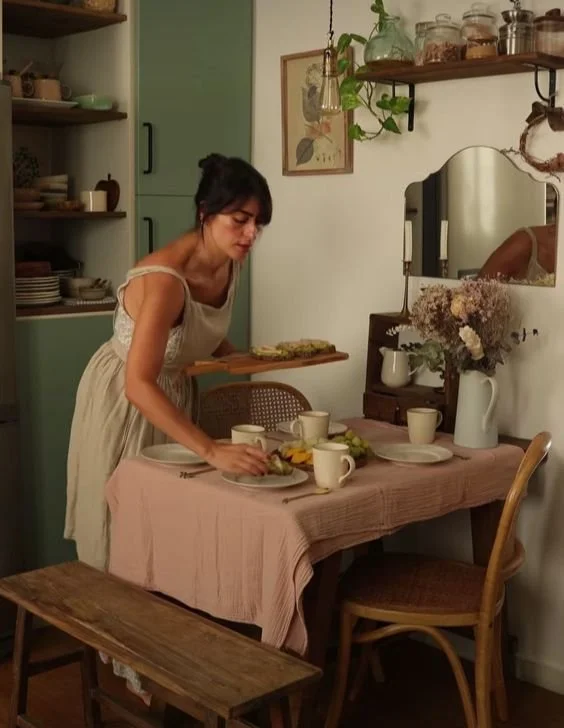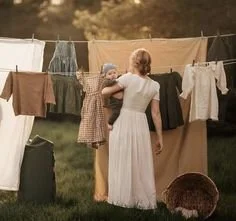Productivity: Using Gifts and Talents
Productivity seems to be a running theme in the broader homemaker community, or it’s something I’m feeling very aware of as of late. Part of it is my ability to do a bit more now and seeking to be wise with what I do. Part of it is the constant fight against communism and all the ways it has invaded our lives. It is so important that we define production broadly, as I talked about here. It is more than a paycheck and more than just tangible things. It is also things we’ve learned, our attitudes, and habits in the home.
Another element of good productivity is acknowledging and using our God-given gifts. Each and every human being is born with gifts, talents, skills, and abilities natural to them. We are responsible for growing, honing, and using those gifts. Doing so is fruitful and profitable, even if they aren’t bringing in direct income into the home.
Acknowledging: I grew up in circles that strongly encouraged discovering your gifts. A bit of perspective to keep in mind is that discovering your gifts and how to use them is a lifelong work. I’m much better equipped to speak to my gifts now than when I was encouraged to select a major. Gifts are far broader and more subtle than seeking a nursing major or an accounting degree. Think about these things to help you sort out your gifts:
Interests: We tend to have interests in the areas we’re gifted in. Start taking note of your interests even outside the domestic arts. What are your hobbies? Given all the time and money in the world, what would you do?
I love Tolkien. I have a high interest in fairy tales and myths, especially European myths and American Western myths. What does this interest tell me about my gifts? Most obviously, that I have a reading gift. Not everyone is a reader, but I’m thankful for that gift and I am trying to grow it, hone it, and use it for the sake of my home, family, and church family, as well as for the sheer enjoyment of the world God made.
This interest also points to the gift of imagination. God provided me with a good imagination. I’m so thankful for this gift. It has helped me romanticize life, make it through hard times, and given me the ability to empathize with people. It helps me see things from a different perspective and what could be as well as what is.
Interests can point to gifts that we have and can put to work in our homes.
What Comes Natural: Another way to acknowledge or find your gifts is to think about what comes naturally to you. What feels like it suits you? Where do you come alive? I’ve shared this before, but in my youth I tried many different forms of artistic expression, while avidly avoiding writing like the plague. When I finally caved and started writing, I felt like I finally knew who I was.
Finding what comes naturally to you can be finding something broad. It requires experimentation. Try different things. You may realize you have a natural gift for history, politics, growing flowers, raising chickens, script writing, managing people, and brewing a perfect cup of coffee. God loves diversity, and He is so much bigger than we are. One person can be gifted with an eye towards garden planning and also curating and collecting thimbles. Explore and seek out your natural abilities and skills, then grow them!
Talk to Others: Close friends and parents can be a big help in this area. Don’t be afraid to ask for their thoughts on your gifts and how you might grow them and use them. They might give you an interesting peek into yourself. Don’t be hard on them if they can’t articulate your gifts or give you a standard vocation like nursing or teaching. It takes a lot of discernment to see other people's gifts and to articulate what the non-surface-level gifts may be. And a lot of gifts only become obvious with use, experience, and maturity. But asking can give you lots of helpful insight.
Using: You can’t be productive if you aren’t using your gifts. Refusing to make time to find them is imprudent and wasteful. It can also show a lack of courage and some innate laziness. Once you have started to get a sense of your interests, what comes naturally, and talked with others, you need to start practicing.
Practicing: This is failure after failure after failure. The complication comes because sometimes failure means we’ve acknowledged the wrong gift, yes, but mostly it means that we’re still learning how to wield it. How do we tell the difference? We keep practicing. Practice, practice, practice. Explore the possible nuances of your gift. Listen to people when they compliment you or thank you. Maybe you are interested in bread making. You practice making bread until your family is overwhelmed by so much bread and so are your neighbors, but you can’t seem to ever get a loaf right. Are you trapped in idealistic perfectionism? Do people thank you for your bread? Do people ask you for an opinion on your bread? Is it possible that you are a cookie maker who has mistaken the interest in bread for the actual interest in cookies? Practice, test, experiment. Don’t box yourself into one thing.
Giving: Gifts are meant to be passed on to others. Making gifts productive is all about how you serve others with them. It doesn’t matter if you make the best cup of coffee in the world if you don’t share that mug with someone else. It does me no good to have the gift of reading if I’m not sharing books I’ve read with others or at least the knowledge I’ve gleaned. It is not productive if it is always just about me and my book, please go away. Our gifts are meant to be used. If we want to be fruitful we must not only see our gifts, but we must see how they can be put to use in our homes, communities, and churches.
Sometimes this is subtle. I love modern military history. God has given me a huge helping of interest in this specific field. I use this gift to engage in conversation with a wide range of people. I use it to help me not get overwhelmed when I’m in the trenches because I have really good examples of courage constantly in my mind. And I use it to deepen my understanding of different aspects of theology. The Bible uses a huge amount of military illustrations and I understand those a lot better when I’m steeped in military history. When I tie this gift with my gift of writing and reading, I’m able to use it to serve others. I’m not in the military. I can’t serve that way. But I can use what I’m reading and watching to bless the people around me through deeper conversation, on-hand illustrations, and examples of virtue.
A Return: When we invest in our gifts and use them to produce goods, we get a return. Money in an IRA is going to get you more of a return than money hidden in your mattress. Gifts used will yield a higher return than our gifts unacknowledged, untrained, and set aside.
What does a return look like? Calmer homes, happy husbands, trained children, healthy churches, and stable communities. Sometimes this is obvious with something like being asked to specifically serve in a certain area because everyone sees your gifts. Sometimes this is subtle with something like your husband humming to himself because he’s simply pleased to be home. One of the best returns on our investments in our gifts is seeing growth in ourselves. Being a reader who can tackle bigger, harder, deeper subjects because you’ve invested in your gift is growth. From that, you can springboard into richer conversation. Brewing the best cup of coffee is a wonderful reward in and of itself. From that, you can share a warm mug with others and enjoy the friendships that spring up from that. Possible returns are as endless as possible gifts given by an endless God.
A couple of warnings about gifts, talents, and skills:
Idealistic Perfectionism: This must be addressed. Nothing will make you waste your gifts faster than some twisted idea of idealism. Idealism can help us see where we would like to be. Idealism can help us see good. But if we let it master us, we will destroy everything around us including ourselves. Idealism says that nothing is worth doing if I can’t instantly be the best. Idealism says I shouldn’t have to practice, hone, and grow, but that I should be the best right now. Idealism only produces imposter syndrome. It truncates you into a tiny goblin that always feels like everyone is out to get you and is constantly talking behind your back about how bad you are. Don’t become a slave to perfection and idealism. Things are absolutely worth doing even if they’re imperfect and temporary.
Worship of Gifts: Our gifts aren’t meant to rule over us, nor are they meant to take precedence over other people. If you have, for example, a musical gift, you don’t sacrifice your marriage, homemaking, childrearing, and church membership for the sake of the gift. You may have to let it lie fallow for a time, you may have to use it only for the benefit of a few people or be creative in how you use it. Using the talents God gave us should never be done with self-focus, pride, and at the expense of our responsibilities, commitments, or in a way that tramples or abandons others. Our gifts are to be laid at the feet of others and to be used to serve, work, and enjoy God.
Maids: Explore! You are in a discovery time of life. Go all out on exploration. Try as many things as you can get your hands on and afford and see what sticks. If something captures your imagination, give yourself the freedom to go down the rabbit hole and see where it leads. Take note of what makes you happy and sift that down to a talent hiding below. Don’t just seek out the big labels like “I want to be a Vet.” Seek out the smaller things like, “I’m a reader. I love Van Gogh. Quilting is fun.” Take those and see what gifts they might be highlighting. You might be a costume maker yet to be discovered. You might be a poet. You might be someone who shares art with others or simply loves the stars.
As you explore all that God gave you, think about how you might use it for the sake of your home and church family. It does you no good to reserve gifts only for yourself.
Matrons: We shouldn’t grow dull just because we’re a little more comfortable in our skin and a lot more busy. It is vital to our homes and families that we keep developing our skills and using them for the good of our people. New skills can bud out from well-tended skills. Let’s not stagnate. There is a vast creation out there, and we have an eternal soul. Let’s stay broad and productive in our homes and keep exploring all the intricate ways God made us.
Crones: You are blessed with perspective. Take note of the women around you and seek to assess their gifts. Then encourage them. A word of praise from you is like a drop of water in a dry land. Nothing can push us women forward like having you in our corner. Keep growing your skills, keep exploring all that God has made, and be ready to help us discern our gifts.
God is infinite. Don’t put Him in a small box by limiting gifts and skills and talents to only the obvious ones. Learn to seek out all your talents and make them productive without limiting productivity to some sort of income, or obvious serving. Each and every one of us women has gifts from God that we are obligated to grow and put to use. There is not a gift that you have that can’t be used in your homemaking, if you have the courage and imagination to make it fit and work and serve your family. Our lives become amazingly broad, dear ladies, when we broaden our understanding of productivity and seek to be fruitful.




